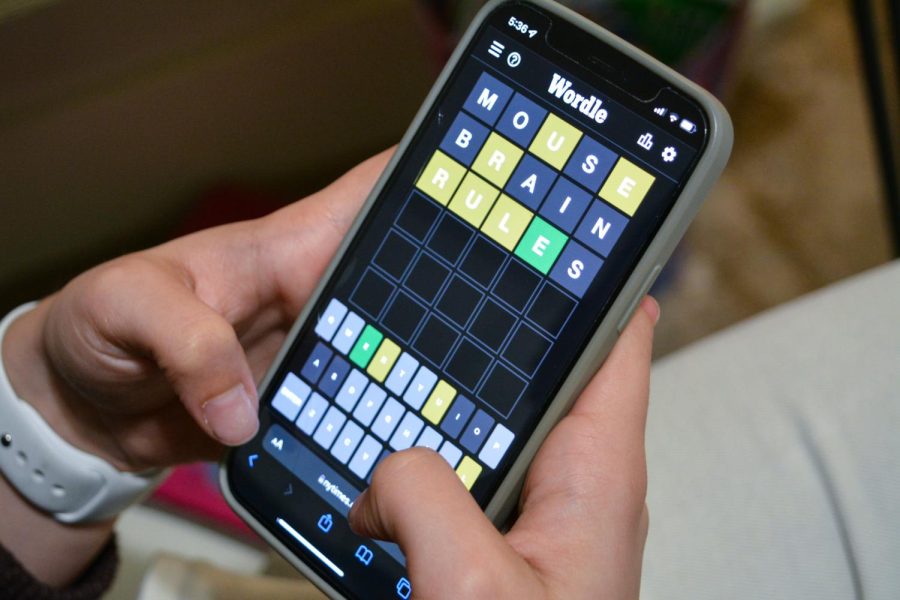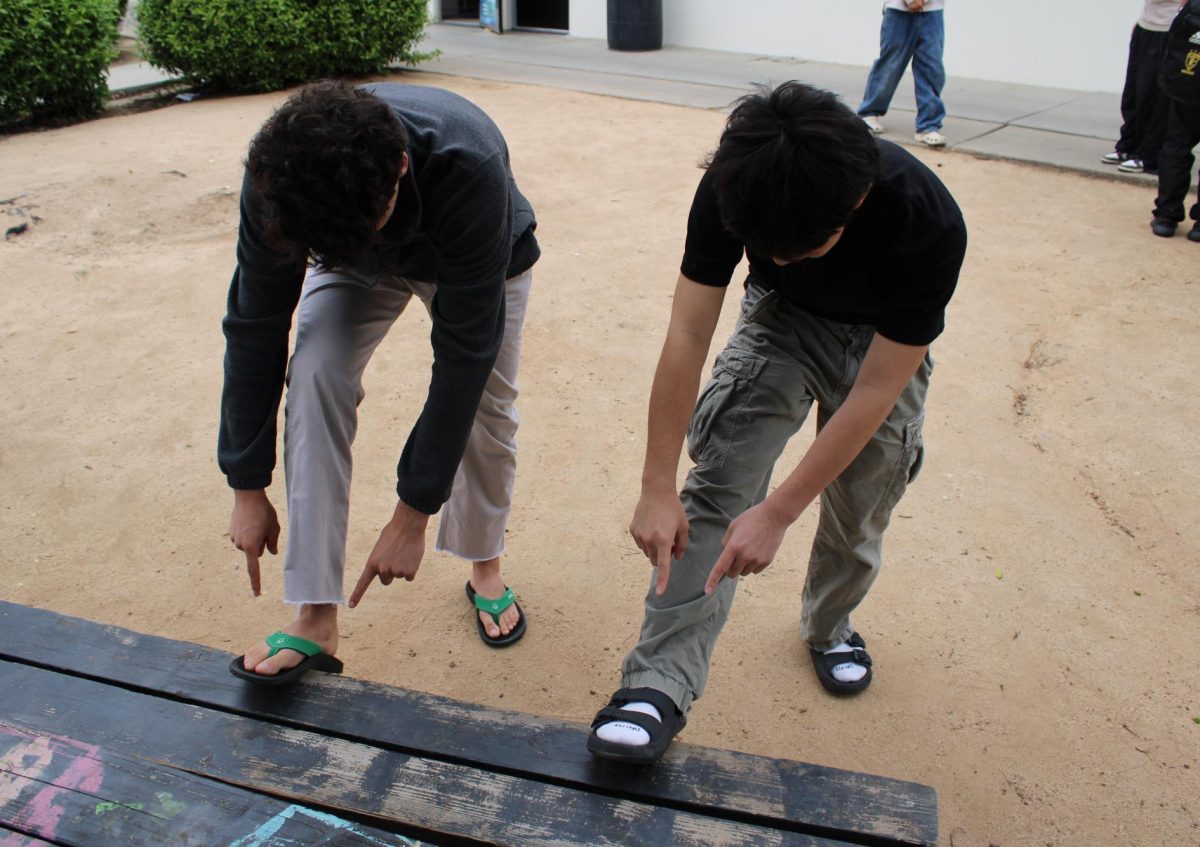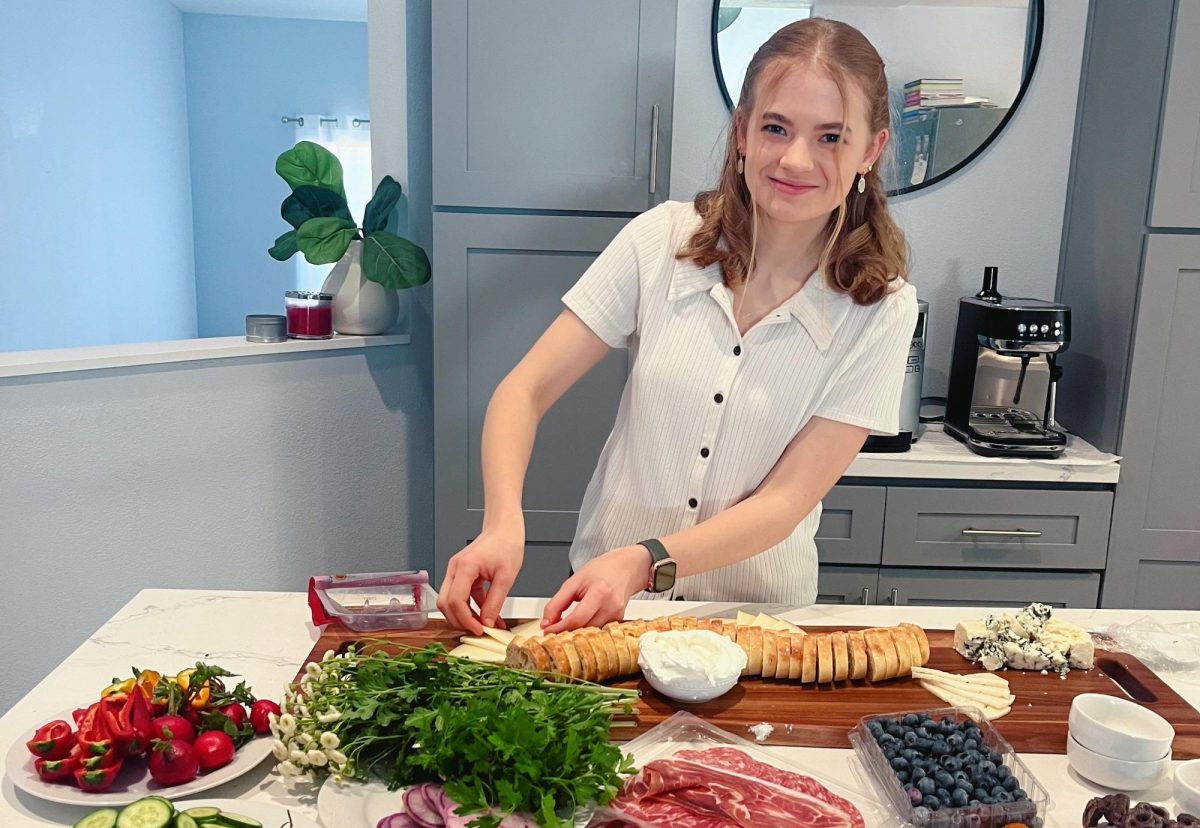For some like sophomore Maximiliano Soto, it’s the allure of beating someone else out to solve a puzzle.
“You get a slight ego boost, so you feel good and get that sense of accomplishment,” Soto said.
For others like junior Robyn Shin, it’s the ability to show off their skills in the English language.
“It makes my day because it makes you feel like you’re smart, like you have such good vocabulary or your deduction skills are really good,” Shin said.
And for those who look at it from a scientific perspective, Advanced Placement Psychology teacher David Fenstermaker said these gamers – also known as “Logicians” – start playing Wordle to join the amassing Wordle community.
“People really enjoy shared experiences,” said Fenstermaker, who has played the game since early January when he was scrolling through Worlde TikTok videos as he was quarantining for COVID-19 and was hooked on it after trying it out for a week. “It makes them feel like they are part of a larger group of people all sharing the same thing. It doesn’t hurt that there is a competitive component [to Wordle], that you can ‘win’ at it or solve it faster than friends.”
These are among the explanations of those who have found themselves daily playing a game called Wordle, which was first created by software engineer Josh Wardle in October 2021 and made available as an online game.
Upon opening the website, players will see a checkerboard of squares with six rows of five small boxes above a keyboard viewer in which global users will have six chances per day to guess the mystery five-letter word of the day before the term gets reset at midnight, Eastern Standard Time.
As users try their guesses, incorrect letters appear in gray, letters that are in the final word but wrongly positioned pop up as yellow and correct letters with the proper placement turn green. (For those who grew up in the 1970s and ‘80s, think Mastermind.)
The guesses must also be actual words.
Soto said he was first introduced to Wordle two months ago in January by his zero period English 2 Honors teacher, Scott Rosenkranz, who posted a link to the website alongside a message that said, “Daily WORDLE,” on his Google Classroom stream for all his classes.
Soto said the transition to this type of a puzzle wasn’t as easy as Crossy Road, another game he sometimes plays in his free time.
“I was a bit clueless, to be honest, but I eventually came around,” he said. “You can start and stop whenever you want, so I feel like, in the back of your mind, you’re trying to think of a five-letter word throughout the day.”
Like many others who were once newcomers to the game, Rosenkranz said he started getting hooked after hearing about his neighbor’s enjoyable experience with the game.
“A neighbor of mine and a friend of mine played every day and mentioned it [in January], and then I started seeing the people post their results on Twitter, so it piqued my interest,” Rosenkranz said. “Most word games … helps us problem solve in general, using the elements of language, and importantly, playing with language.”
Players sharing their scores is a common sight on social media platforms like Twitter and TikTok; instead of displaying attempted letters or the final word in the post, people usually post their “scores” as a collage of wordless yellow, green and gray squares to show many tries it took for the player to get the word.
After getting the word, players have been able to continue their fun through social media as they create posts that include celebration for someone’s first Wordle or even rants about how difficult the day’s word was.
“Kiddo put unnecessary pressure on me today to get today’s #Wordle,” a March 15 Twitter post said. “[The kiddo said] AH! C’mon. It took me four words today. You’ll probably get it in three. You’re smarter than I am.”
One of the top liked TikTok videos titled, “When your Wordle streak finally ends,” with 1.2 million likes and many out of the 7,541 comments as of March 15 sharing their condolences and finding themselves in the same shoes, exemplifies how social media platforms bridge people sharing a common interest in the game.
“Social media [helped it gain popularity] because they don’t give you the word, but they show you how many tries,” Rosenkranz said. “Things that become popular have to be simple, clear, fun and free, and I think [Wordle] does all of those things.
“People are looking for ways to connect with each other, so it’s another way to connect.”
After players get the word, a statistics sheet pops up in the center of the screen that displays the users’ streaks, including how many times they were able to guess the word in a certain number of tries. On the bottom right hand corner is a green, “Share,” button that allows users to copy the results and share them on social media platforms, including Twitter and Facebook.
As a result, Wordle has been trending on Twitter, ranking No. 19 on the most used hashtag list in early February, and the top-liked, Wordle-related TikTok has more than 450,000 likes with the tag, #wordle, amassing over 172.6 millions views.
For freshman Sienna Shah, her mom’s Facebook account that was peppered with green, yellow and gray boxes of people’s scores is what aroused her interest in the game early February. Once the freshman played her own round of Wordle, she was able to understand the craze about the game.
“Getting a word kind of motivates you,” Shah said. “You might be having a really bad day, but when you get the word, there’s that little piece of something good that happened, making your day a little better.”
After explaining the game to her mom as well, the freshman said that Wordle has been an enjoyable parent-child activity — and being able to beat her mom is a bonus.
“It’s fun to play individually, but from my personal experience it’s also really engaging and a fun competitive game to play with parents,” Shah said. “It’s also not like Fortnite, where it’s super complicated, and you have to be tech savvy, so it definitely mends the generation gap.”
Fenstermaker also agrees that Wordle is a better alternative for students to play since it also enhances their English.
“Am I worried that students are going to be addicted to a word game that forces them to think about vocabulary and use words effectively,” Fenstermaker said. “No, not at all.”
Rosenkranz said the game has also become an enjoyable way to interact with his students during class time.
“Sometimes I’ll see my [students] do it, and especially if they get a word in three tries, I’ll say, ‘Hey, good job. That took me four tries,’ ” the instructor said.
Not only have people taken interest in getting the final word, but students like Shah also find fun in devising the most effective strategy to solve the puzzle in the least amount of tries.
“I try to start with words that have more vowels in them,” she said. “So one of the words I commonly start with is ‘s-o-a-r-e,’ which just means a young hawk.”
Other popular words students start with are “adieu” (French for “goodbye”) and “irate,” which Shin said are her and her friends’ go-to words when she starts off her day with an attempt at Wordle in her second period Korean 3 class.
The catch for Shin was that users only have one word to do a day, which she said makes keeping streaks that much more special.
“Although I said I didn’t like the fact that you could only play one time, it does make it feel like more people are trying to play them because when things are more elusive, it’s just more interesting,” the junior said. “It’s sort of like I have to do it every day because it’s only one chance a day.”
Some students said they were alarmed by the news that the New York Times had bought Wordle on Jan. 31.
“Although [the New York Times] said it would be free, I don’t entirely buy that,” said Soto, who plans to stop playing if the Times starts to charge users. “I think users can expect to see ads pop up, which weren’t there before.
“It would disrupt the clear display, but I don’t really mind that much.”
Though the general manager at the New York Times, Jonathan Knight, said he cannot comment on future plans regarding the game, he is looking forward to continuing the pleasant experience Wordle players have been having.
“The game has captured a huge audience because of its simplicity and approachability as well as its social sharing — the fact that we’re all trying to solve the same, common, five-letter word every day,” Knight wrote in an email to The Accolade. “It’s also time well-spent that fits into your day and doesn’t demand too much of you.
“We’re really pleased and honored to be the stewards of this wonderful daily puzzle.”
And many students have come to see this daily puzzle as more than just a simple guess-and-check game — it’s a way for them to relate with and meet new people and build stronger bonds with friends through a simple puzzle.
“I definitely felt a sense of being a part of a group,” Shin said. “Not everyone I know plays Wordle, so when you do, it’s like, ‘Oh, we’re like in the same group together’ — we are kind of like on the same team.”














